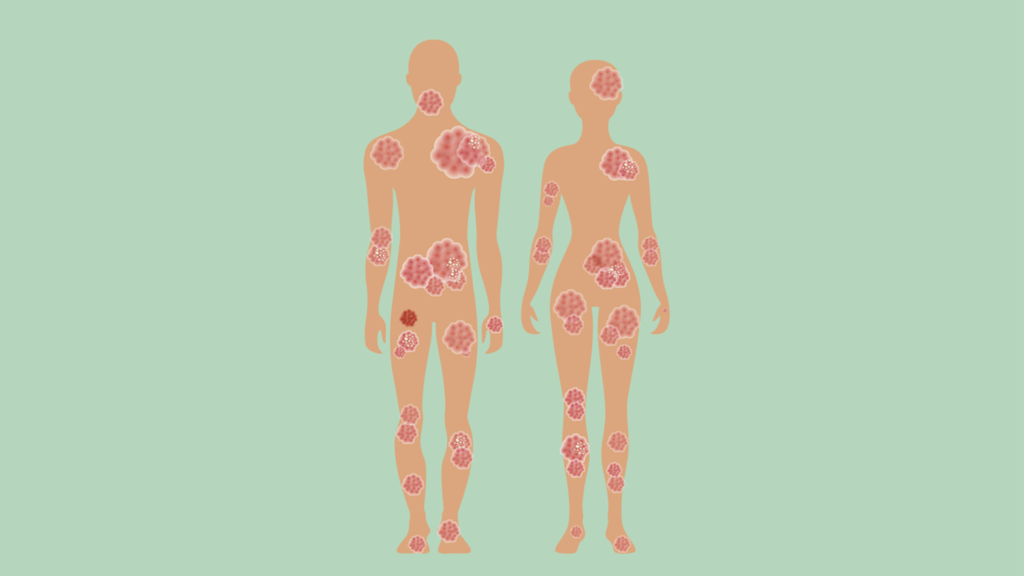Psoriasis is a common, chronic skin condition that results in rashes and itchy scaly patches. The rashes can be painful, distracting and even interfere with sleep. A rare variation of psoriasis is generalized pustular psoriasis (GPP), a neutrophilic skin disease. Unlike psoriasis, GPP is characterized by widespread eruptions of painful, sterile pustules caused by neutrophils (a type of white blood cell) accumulating in the skin. Accompanied by fever, fatigue and systemic inflammation, the flares subside and reappear periodically. Flares can be life-threatening because if left untreated, they can lead to sepsis and potentially organ failure. Since only 1 in 10,000 individuals are affected in the US, GPP’s rarity makes recognizing symptoms a challenge and can delay diagnosis.
Until recently, there have been minimal options for treating GPP flares, with dermatologists being able to prescribe two medication options: etanercept (a biologic) and cyclosporine, infliximab (another biologic) and methotrexate, or infliximab followed by etanercept.
On September 1, 2022, Boehringer Ingelheim Pharmaceuticals announced in a press release that the US Food and Drug Administration (FDA) approved Spevigo (spesolimab-sbzo) intravenous injections for GPP flares in adults. Spevigo is the first approved treatment option for GPP in adults.
Clinical Trial Behind Spevigo
The efficacy of Spevigo (spesolimab) was determined based on the results of the Effisayil 1 double-blind, randomized, Phase II clinical trial. Fifty-three individuals between the ages of 18 and 75, living with GPP and experiencing acute, moderate to severe flares were enrolled and treated with either Spevigo or a placebo treatment for 12 weeks. One week after treatment with 900 mg of spesolimab, 54 percent of patients treated with Spevigo no longer displayed visible pustules, versus the six percent who received placebo treatment.
GPP occurs in individuals with specific gene variations as it is a genetic disease, and variations in the genes IL36RN and AP1S3 are known to cause it. The novel, selective monoclonal antibody spesolimab behind Spevigo reduces flares in individuals by inhibiting interleukin-36 (IL-36) signalling. It does so by blocking the activation of IL-36 receptors, which are the key part of the signalling pathway involved in GPP. IL-36 causes the over activation of specific inflammatory cytokines and immune cells like neutrophils, which accumulate and result in the GPP pustules. The role of the IL-36 receptor was confirmed in loss-of-function mutation studies in the IL-36 receptor antagonist gene.
In the clinical trial, Spevigo was found to be safe and effective, with the most common treatment-related adverse events being asthenia (abnormal weakness) and fatigue, nausea, vomiting, headaches, pruritis and prurigo, and bruising at the injection site. Although the sample size of patients was small, the effect sizes for the primary endpoint (no visible pustules) one week after treatment was large enough to support the use of Spevigo as a treatment.
A Promising Treatment for a Rare Disease
“The approval of Spevigo is a turning point for dermatologists and clinicians. We now have an FDA-approved treatment that may help make a difference for our patients who, until now, have not had any approved options to help manage GPP flares,” said Mark Lebwohl, MD, lead investigator and publication author, and Dean for Clinical Therapeutics, Icahn School of Medicine at Mount Sinai, Kimberly and Eric J. Waldman Department of Dermatology.
Longer trials are needed to fully understand the effects and safety of Spevigo in those affected by GPP using the treatment long-term. Currently, longer-term use of Spevigo is being evaluated in the form of a subcutaneous formulation in a five-year long open-label extension trial, as well as in an Effisayil 2 trial focused on the prevention of GPP flares.












Join or login to leave a comment
JOIN LOGIN